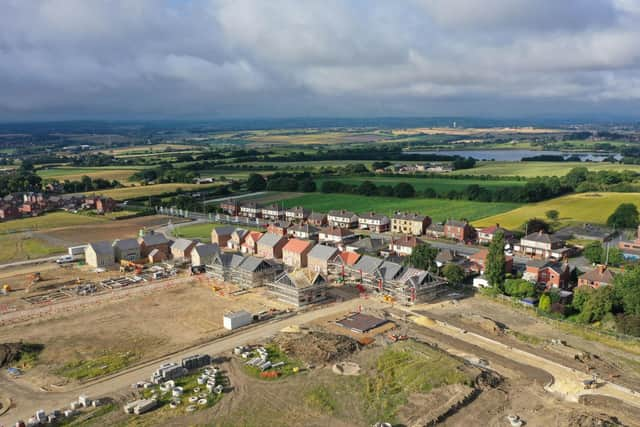Yorkshire people may lose ability to object to planning applications due to Robert Jenrick's Planning for the Future White Paper, says York councillor
Andrew Waller of City of York Council said reforms to the way developments are approved should "not be at the expense of public involvement" and must still allow councillors to represent the views of communities.
But Housing Secretary Robert Jenrick today defended his sweeping reforms to the planning system against criticism that the move to speed up building will create slums and ignore local concerns.
Advertisement
Hide AdAdvertisement
Hide AdMr Jenrick dismissed allegations the draft laws for England could create a new generation of low quality homes as "complete nonsense".
And he insisted local people will be able to make "a meaningful contribution", despite confirming there is nothing that can be done to halt disliked projects once an area is designated for growth.
Prime Minister Boris Johnson and his senior aide Dominic Cummings have both advocated reform to the system and the proposals in the Planning for the Future White Paper set out the Government's vision.
The new process will involve quicker development on land which has been designated "for renewal", with a "permission in principle" approach that the Ministry of Housing, Communities and Local Government (MHCLG) said will balance the need for proper checks with a speedier way of working.


Advertisement
Hide AdAdvertisement
Hide AdThe other two categories will see land designated for growth where new homes, hospitals and schools will be allowed automatically to empower development, while areas of outstanding natural beauty and the green belt will come under the protection category.
Coun Waller, York council's Executive Member for Economy and Strategic Planning, said: “Nationally, nine in 10 planning applications are approved by councils, while more than a million homes given planning permission in the last decade have not yet been built. This includes thousands of homes in York.
"If the Government’s proposals in this consultation were to be implemented many residents may find that they have lost the ability to object to applications that they currently take for granted.
“The planning system does need to change but not at the expense of public involvement, and the ability for councillors to represent their communities.
Advertisement
Hide AdAdvertisement
Hide Ad"Many problems are caused by overturning local decisions in remote Government Offices often with great delays involved, this issue should also feature in the proposed consultation. Otherwise the planning process will become even more centralised and decisions will be further removed from the communities affecting them."
Meanwhile, Labour councillor Lisa Mulherin, Leeds City Council's Executive Member for Climate Change, Transport and Sustainable Development, said: “The Government’s proposed changes to the planning system, and in particular the idea to effectively give developers automatic planning permission, is a very worrying move indeed.
"We have seen many independent voices express their concern about the proposals already, and it does appear the Government wants to bring in some form of developer’s charter.
“They want to reduce the ability of local people and their councillors to challenge unsuitable developments, reducing local accountability and risking a worsening of housing standards."
Advertisement
Hide AdAdvertisement
Hide AdAndrew Carter, leader of the Conservative group in Leeds, welcomed the Government's plan for all new streets to be tree-lined and the intention to increase the amount of green space.
But he said: "Any attempts to streamline the planning process and cut red tape must ensure that local communities still have ample opportunity to comment on and influence
proposals for development in their areas."
Speaking to the BBC, Mr Jenrick said the plan would increase local oversight, while confirming objections would be futile once an area was designated for growth.
"You won't be able to do something then, but you wouldn't be able to do very much today either," he told Today, arguing current engagement with planning applications is low.
Advertisement
Hide AdAdvertisement
Hide Ad"What we're asking for people is to have a meaningful contribution to the planning system and for that to happen early on when you actually produce the plan."
Mr Jenrick has insisted "we will cut red tape, but not standards" as he says it currently takes seven years to agree local housing plans and five years to get building.
It also aims to boost the share of houses built by small and medium-sized building firms, which built 40 per cent of new homes 30 years ago but only 12 per cent today.
The White Paper proposes that all new streets should be tree-lined and the MHCLG also says "all new homes to be carbon neutral by 2050, with no new homes delivered under the new system needed to be retrofitted".
Advertisement
Hide AdAdvertisement
Hide AdCouncils will also be forced to lay out a "local plan" of where new homes can be built, as only 50 per cent have such schemes in place.
One of the authorities without a plan setting out a long-term vision for development is City of York, which submitted a blueprint to deliver over 20,000 homes over the next 20 years, including up to 4,000 more affordable homes.
But the document has yet to be approved after government inspectors raised concerns about "intrinsic flaws" in the methodology used to decide the area which should be designated as protected Green Belt land.
Comment Guidelines
National World encourages reader discussion on our stories. User feedback, insights and back-and-forth exchanges add a rich layer of context to reporting. Please review our Community Guidelines before commenting.